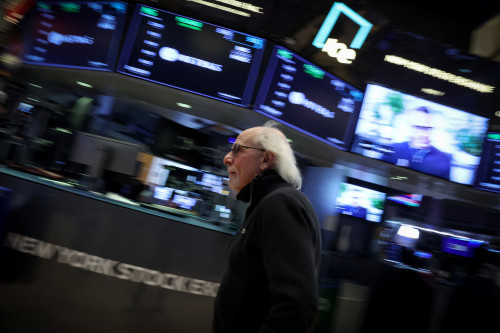By Lananh Nguyen and Sinead Cruise
NEW YORK/LONDON (Reuters) – Wall Street bosses are girding for Europe to sideline American investment banks in response to the tariff war unleashed by U.S. President Donald Trump, fearing client boycotts and in a worst-case scenario, even formal restrictions.
More than half a dozen senior bankers and advisers told Reuters they are bracing for European Union governments and companies to do more business with home lenders, which could quickly dent their market share.
Two bank industry groups have discussed how Europe could act to restrict U.S. banks’ activities in the region, two people said, and at least two major banks have also held internal talks on the matter, according to two senior executives. All requested anonymity because the discussions are private.
One such tool at the EU’s disposal is the Anti-Coercion Instrument (ACI), conceived in 2021 amid rising concerns at the time about the weaponization of trade by the U.S. and China. The ACI enables the bloc to place restrictions on foreign financial services companies, limiting their access to EU markets.
Meanwhile, in a sign of possible anti-U.S. sentiment, French President Emmanuel Macron called for European companies to suspend planned investment in the United States following Trump’s sweeping tariffs.
JPMorgan CEO Jamie Dimon, asked if he was seeing any anti-American sentiment among clients in an interview with Fox Business’ “Mornings with Maria” on Wednesday, said:
“We’ve lost a couple of bond deals already…they simply say that, you know, we’d rather just do this with a local bank than with a U.S. bank.”
EU countries on Wednesday approved the bloc’s first countermeasures against the United States, joining China and Canada in retaliatory moves that could tip the world into recession. Following those announcements, Trump said he would temporarily lower new tariffs on many countries, even as he raised them further on imports from China.
More measures could be on the way. EU Trade Commissioner Maros Sefcovic said on Monday the EU was ready to consider all retaliatory options. “We are prepared to use every tool to protect (the) single market,” he said.
Meanwhile, officials at the European Central Bank said they were fully mobilized to ensure the euro zone economy remained stable and well financed.
Disentangling U.S. banks from the European financial system wouldn’t be an easy task. While they account for only a very small portion of the region’s loans and deposits, Wall Street firms dominate parts of securities trading, including derivatives.
U.S. lenders have invested heavily in European businesses since the 2008 financial crisis, and even more so after Brexit. When Britain left the EU, Brussels demanded Wall Street banks bolster their EU outposts with additional capital and local staff, leading to thousands of jobs being created.
While the U.S. banks don’t provide a geographical breakdown of their earnings, they do provide a window into the size of the business. For example, Germany, the United Kingdom and France are JPMorgan’s first, second and fourth-largest country exposures outside the U.S., respectively.
The U.S. firm earned the biggest share of investment banking fees in the region during the first quarter of 2025, or about $514 million for 8.2% share of the total fee pool, LSEG data shows.
Still, Europe can draw on its experience overcoming the complexities of Brexit, when it untangled a major partner from the bloc, another person familiar with the matter said. Restrictions on Wall Street firms could be partial, for example, the person added.
ERODING ADVANTAGE
“The advantage of the U.S. banks is eroding,” said a senior financial executive, who declined to be identified discussing the policies.
In securities trading, clients are debating whether they should switch to European counterparties from U.S. banks, another of the sources said, adding that this has never been discussed before.
Recent dealmaking for the likes of Volkswagen and Porsche have underscored the heavy influence of U.S. banks over their European rivals, but some EU-based advisers said they were already seeing greater numbers of local banks hired on deals.
Fear by U.S. firms that finance could become a weapon in the trade war is also shared by allies in Europe, where allies worry access to credit cards and the provision of dollars to their banks could be curtailed.
Companies and banks are considering the tail risk that the U.S. could pull U.S. dollar funding lines, in a move that could put the European financial system in jeopardy, one of the people said.
Reuters reported last month that some European officials are questioning whether they can still rely on the U.S. Federal Reserve to provide dollar funding in times of market stress.
“For Europeans, it’s whether they would prefer national champions,” one of the people said. The world is nationalizing and there are some political risks seen with U.S. banks.”European investment banks have smaller balance sheets and aren’t as deep pocketed as their U.S. peers.
“You see this undifferentiated anti-Americanism, but it just doesn’t hold for very long. These emotional moments will give way to companies going back to their rational economic interests,” one of the financial executives added.
Samuel Gregg, political economist at the American Institute for Economic Research, said placing restrictions on U.S. financial services operating in the UK and the EU would be an act of self-harm for Europe.
“It would be a huge leap for Europe to try and fill the yawning gap that would ensue from placing restrictions on U.S. financial services. The same restrictions would also add to the damage upon European economies likely to flow from U.S. tariff increases,” Gregg said.
(Reporting by Lananh Nguyen in New York and Sinead Cruise in London; additional reporting by Tatiana Bautzer in New York, Anousha Sakoui, Stefania Spezzati, Elisa Martinuzzi in London, Emma-Victoria Farr in Frankfurt and Jan Strupczewski in Brussels; Editing by Elisa Martinuzzi and Anna Driver)




